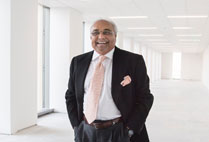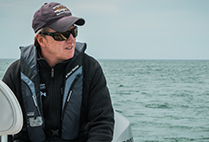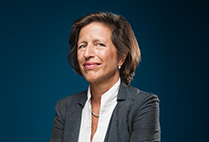When choosing a career, few people have the option of weighing the merits of becoming an acclaimed novelist versus a top cancer researcher. Weike Wang (GRS’15) is part of that select group.
Last April, she successfully defended her doctoral dissertation in cancer epidemiology at Harvard’s T. H. Chan School of Public Health, and in May her debut novel, Chemistry, was published by Knopf. Wang was working on an MFA at BU during the third year of her doctoral program and acknowledges that enrolling in both simultaneously made for “a really intense couple of years,” but says the result was worth the effort. Chemistry, the story of a PhD student questioning whether there’s life outside of academia, has been praised by critics at Science Magazine and the New York Times. Wang, who lives in New York, is at work on her next novel.
BOSTONIA: Your protagonist, like you, is a first-generation American in an elite PhD program, a high school and college exam tutor, and a dog lover. How do you decide what life experiences to include in your fiction?
WANG: I was writing Chemistry at a time when I was under a lot of pressure, doing the MFA and PhD programs, so I channeled that mentality into the narrator—but nothing that happens to her happened to me. I had to give her actual problems: her ex-boyfriend, her parents, and her overall sense of failure that she didn’t do what she set out to do. She is trying to figure out how to be her own person, and she is trying to do that with many obstacles.
You were the first person to enroll in BU’s Creative Writing Program while working on a doctorate in cancer epidemiology. Do these interests complement each other?
One side doesn’t understand the other very well. But I think how they might be related is that science teaches you to be clear and to the point in your writing. Having teachers like authors Amy Hempel at Harvard and Sigrid Nunez, a Creative Writing Program lecturer, helps with that because they both emphasize clarity. And I like writing about science in fiction; it feels natural to me.
Did you ever consider delaying one course of study in favor of the other?
I didn’t have the luxury of putting it off; if you defer admission to the writing program, you have to reapply the next year. So I thought, let’s do this. I was terrified but I am glad I did them together. How else would you know what you love, if you don’t love it at a time of intense pressure to succeed?
One of the novel’s themes is a love for pure science along with distaste for research and academia. Does that theme resonate for you?
I’ll be the only nonscientist in my family. I’ve always had it in my life. It’s like asking someone else when they learned to play baseball—I don’t even know when I began to learn it, it’s just ingrained in me. I love science dearly. It’s hard to not do it for a living, but I’m also very bitter about it for a lot of reasons. I don’t like the politics of research, and there’s such a hierarchy in the system. But I didn’t want to bring these things into the book; the character loves science and wants to figure out how to use that love for another purpose, like teaching. Not everyone who loves baseball goes on to be a professional baseball player, but you can still love the game.
The pressure the narrator feels from her Chinese parents is brutal at times. Why was that important for you to include?
Well, my dad was a scientist, and my mom was a scientist, and all my friends who are Asian are doctors. I’m always stumped by the question: if we didn’t have this expectation, if we felt like we had a choice, would we have gone into these fields? In a way I think it’s good that we did because it’s good to have STEM knowledge, especially in this day and age. But there is a negative side—I think you have to be urged into the field for the right reasons—and I think that’s what the narrator is trying to work out, coming to terms with that.
How do your writing peers respond to your research achievements, and vice versa?
My writing cohort is pretty understanding. If you asked my peers in research, they’d probably think I was wasting my time. My friends from college, and my parents, haven’t even read the book. But I felt I needed to write something like this because this was the only way to prove to anyone that I could do it. Also, when I was reading the canon, I never felt represented, so now I always like to write what I would have wanted to read.
You’ve said the books you felt most connected to as a child were Anne of Green Gables and A Wrinkle in Time. What about those stories appealed to you?
When I was 10, 11, 12, and reading those stories, I was just reading a good story. Anne of Green Gables was such a nice escape. In hindsight, I think more about who these characters are and what appealed to me about them. “Normal” is whatever you grow up with, and I grew up with Caucasian characters in lead roles. But when reading about Anne and Meg from those stories, I didn’t think much about race—they were both spunky, smart girls, and that’s what I related to. Smartness is transcultural.
I’ve always liked reading books with female protagonists, and I’ve always gravitated toward writing them. The viewpoint is more comfortable for me, and I like writing from an Asian American angle. The Asian American female voice is marginalized, often invisible. Writing is important to me because while I don’t have that formidable of a voice when I speak, I can be much stronger on the page.
Until your novel was published, you worked in both the research and writing worlds. Why have you chosen writing over research?
I wrote in college, and minored in English, but I applied to the MFA program on a whim. If I hadn’t gotten in, I think I would have taken it as a sign to just move on. But when the book got sold, I realized, “This is happening for real. I need to get my act together.”
You can’t go into research part time—it’s like trying to mother part time. So once you’re off the train, you’re off. I think Americans, and some readers, don’t believe in final-final. They think there’s always a way. But I can’t get a postdoc because it would take a lot of time away from writing, and I think I want to see if I can get another book published and keep going down that route. It’s still a difficult choice. I’ve always had science in my life, and now that I don’t do it every day it feels a little weird.













































Related Stories
Weike Wang Wins Whiting Award
A PhD’s novel about a PhD student takes emerging writer prize
Science vs. Religion
Faculty and students talk about faith in the sciences
Helping Women in India without Leaving Boston
Technology makes SAR long-distance collaboration possible
Post Your Comment